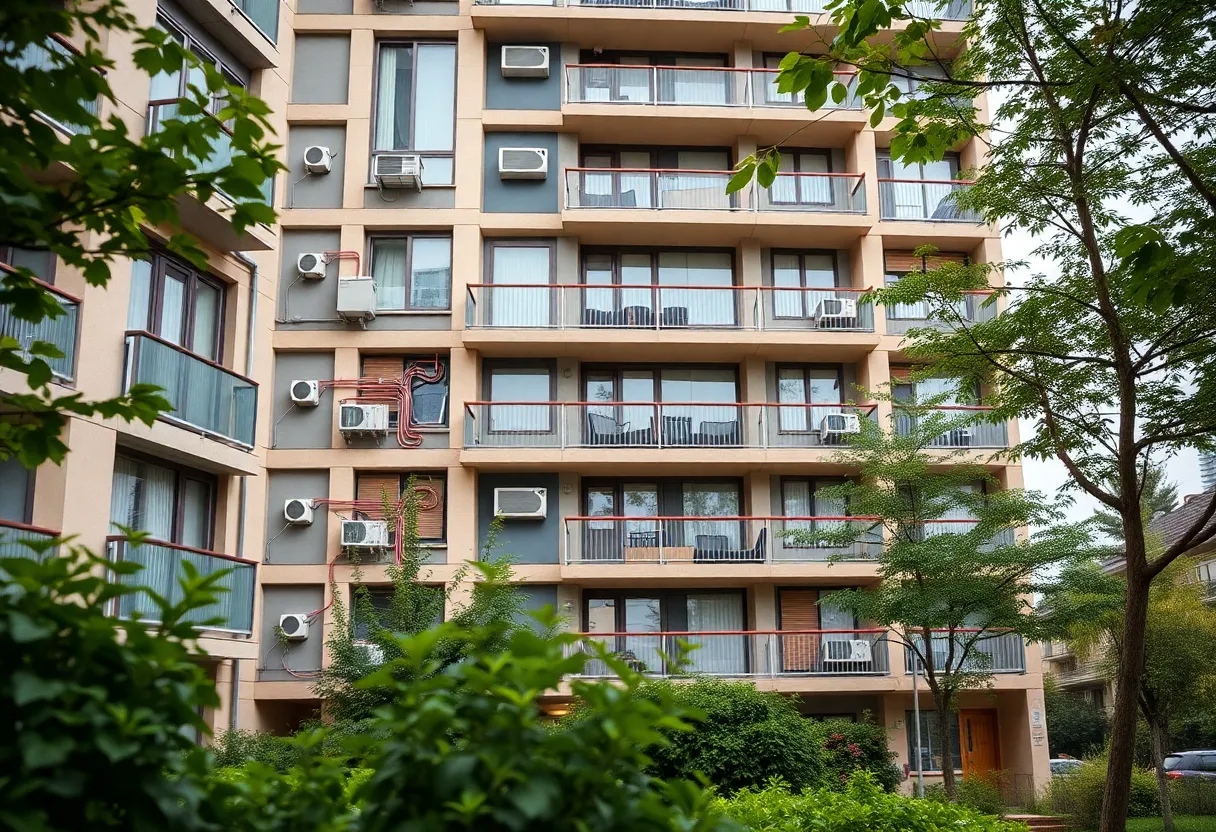News Summary
Starting January 2026, New York State will require most newly constructed buildings to use electric heating and appliances, moving away from fossil fuels. This law aims to improve environmental sustainability and reduce greenhouse gas emissions while addressing health impacts associated with fossil fuel use. The regulations will apply to buildings up to seven stories by the end of 2025, with exceptions for certain types. While the move has faced opposition, supporters argue it marks a significant step in climate action and justice.
Albany, New York – Beginning January 2026, New York State will enforce a law mandating that most newly constructed buildings utilize electric heating and appliances. This significant regulatory shift is part of a broader effort to enhance the state’s environmental sustainability and reduce greenhouse gas emissions.
The legislation, signed into law last month under the 2019 Climate Leadership and Community Protection Act, prohibits the use of natural gas, propane, or other fossil fuels for heating in most new buildings. The State Fire Prevention and Building Code Council recently approved the all-electric building standard, setting a clear path for compliance.
Under this new regulation, compliance will be mandatory for new buildings up to seven stories tall starting on December 31, 2025. For larger commercial and industrial buildings exceeding 100,000 square feet, the all-electric requirement will take effect in 2029. There will be specific exemptions for buildings such as laboratories, crematoriums, restaurants, and those that can demonstrate an inability to support electric heating through the grid.
Environmental Impact and Justification
Proponents of the legislation view it as a critical measure in New York’s ongoing climate action policies. Buildings contribute approximately 31% of the state’s total greenhouse gas emissions, making them a focal point for needed reductions. By transitioning to all-electric heating systems, the state aims to improve air quality and reduce harmful emissions typically associated with fossil-fuel-based heating.
The anticipated health benefits are substantial, as fossil fuel use has been linked to billions in health costs and around 2,000 premature deaths in New York in recent years. The switch to electric systems is believed to mitigate these negative health impacts considerably.
Economic Considerations
While the new laws are positioned as beneficial for the environment, they come amid concerns regarding housing costs and construction timelines. Critics, including some fossil fuel interests and building industry groups, argue that the regulations may lead to increased construction costs, potentially adding up to $20,000 per residential unit. However, the long-term savings on energy bills are expected to offset these initial costs, with average household savings projected at about $5,000 over three decades.
A report from the New York State Energy Research and Development Authority indicates that many households could expect a payback period of 10 years or less due to reduced energy use spurred by the implementation of electric heating systems, such as heat pumps.
Public Response and Legal Challenges
The legislation has encountered pushback, particularly from some community advocates who express concern that it may disproportionately affect low-income neighborhoods and raise housing expenses. Nevertheless, supporters of the law maintain that it represents significant progress in addressing environmental issues and promoting climate justice.
The law’s framework has been upheld in a recent court ruling against challenges that argued federal preemption over state regulations. This ruling reinforces New York’s authority to enact such environmental standards, paving the way for a comprehensive all-electric infrastructure in the construction sector.
Conclusion
The implementation of the all-electric building code stands as a critical component of New York’s long-term energy and environmental strategy, aiming not only to foster sustainability but also to lead the way in reducing the state’s dependency on fossil fuels. As January 2026 approaches, the focus will be on ensuring compliance while addressing the economic implications for the residential and commercial construction sectors.
Deeper Dive: News & Info About This Topic
HERE Resources
New Law Mandates Electric Power for New Buildings in NYC
Elkhorn Schools Open Amid Construction and Safety Concerns
Trump Claims Golf Championship Amid Cheating Allegations
New York Implements All-Electric Building Standards
New York Faces Energy Strategy Challenges Under Hochul
New York Enforces All-Electric Heating Systems in New Buildings
New York Governor Reassesses Climate Goals Amid Rising Energy Demand
New York State to Mandate All-Electric Buildings by 2026
New York State Mandates All-Electric Heating for New Buildings
Proposed Utility Rate Hikes Spark Backlash in New York
Additional Resources
- Canary Media: New York Finalizes Gas Ban
- Wikipedia: Electric Heating
- WGRZ: NYS Law Forces All Electric for Most New Building Construction
- Google Search: New York gas ban 2026
- Politico: New York Moves to Electrify Buildings
- Google Scholar: New York electric building code
- NY Focus: New York Electric Building Code
- Encyclopedia Britannica: Greenhouse Gas Emissions
- Times Union: New Buildings in New York Face Major Shakeup
- Google News: New York all electric buildings

Author: STAFF HERE NEW YORK WRITER
The NEW YORK STAFF WRITER represents the experienced team at HERENewYork.com, your go-to source for actionable local news and information in New York, the five boroughs, and beyond. Specializing in "news you can use," we cover essential topics like product reviews for personal and business needs, local business directories, politics, real estate trends, neighborhood insights, and state news affecting the area—with deep expertise drawn from years of dedicated reporting and strong community input, including local press releases and business updates. We deliver top reporting on high-value events such as New York Fashion Week, Macy's Thanksgiving Day Parade, and Tribeca Film Festival. Our coverage extends to key organizations like the Greater New York Chamber of Commerce and United Way of New York, plus leading businesses in finance and media that power the local economy such as JPMorgan Chase, Goldman Sachs, and Bloomberg. As part of the broader HERE network, including HEREBuffalo.com, we provide comprehensive, credible insights into New York's dynamic landscape.





